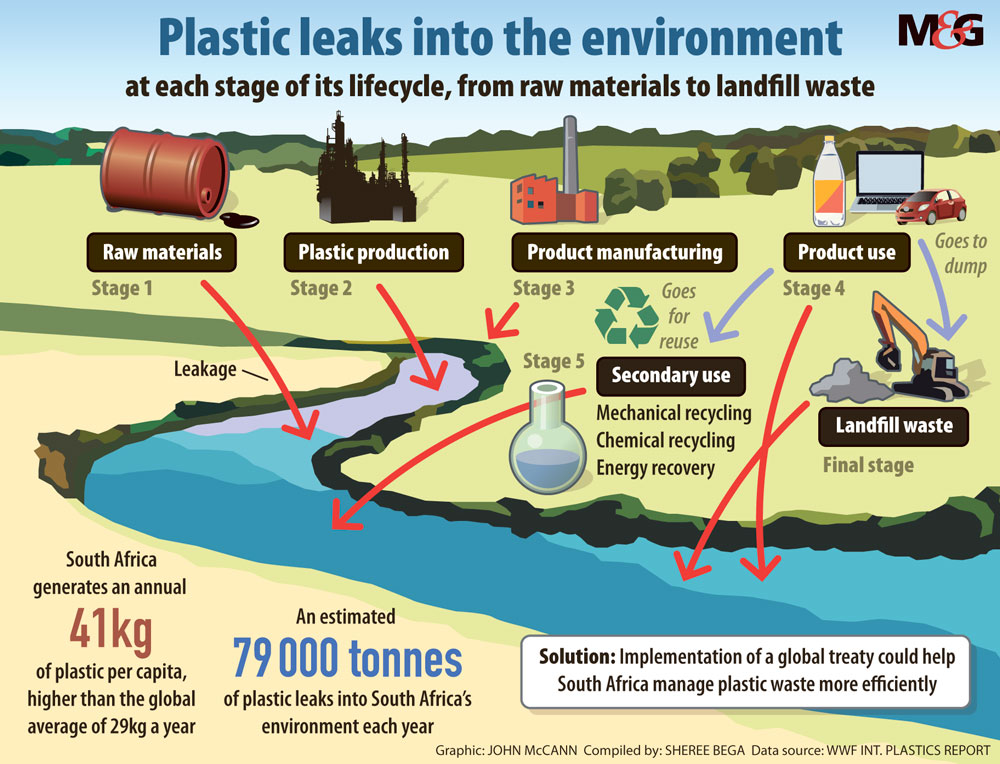South Africa’s support for the strong, global plastic treaty is hailed as progressive.
South Africa’s announcement that it is committed to supporting the world’s first plastics treaty at the upcoming United Nations Environment Assembly (Unea) to be held in Kenya next week has been described as a progressive move.
The cabinet has adopted the country’s negotiating mandate on the draft resolution to be tabled at Unea’s fifth session in Nairobi from 28 February until 2 March, which aims to tackle marine litter and plastic pollution in line with the position proposed by the African continent.
The talks, which will kickstart work towards a strong, legally-binding treaty, could “represent the most important development on the global environmental agenda” since the Paris Agreement on climate change in 2015, according to the United Nations Environment Programme (Unep).
South Africa’s position is in support of mandating the executive director of Unep to establish an intergovernmental negotiating committee (INC), under Unea, to “negotiate an internationally legally binding instrument on plastic pollution given the environmental challenges faced as a consequence of plastic pollution”, according to the department of forestry, fisheries and the environment.

In June last year, the Mail & Guardian reported how leaked draft documents from the department indicated South Africa’s intention to reject the proposed treaty after the department consulted only the plastics sector and other business interest groups. The country is ranked as the 11th worst global offender of leaking land-based plastic into the ocean in absolute terms.
“We were quite happy to see South Africa take this position because for a long time it appeared that they were pretty much adopting industry driven positions,” Niven Reddy, the African coordinator of Break Free from Plastic, told the M&G.
“It’s definitely a progressive move but I think the government needs to back up this move by starting to translate this to more ambitious national actions that demonstrate how we can reduce the impact of plastic at source by adopting zero waste systems that focus on preventing the production of plastic rather than mechanisms to manage the problem once it is created.”
The plastic industry, he said, has “greenwashed” its way to frame the issue of plastic as a waste management issue. “We hope that support for a plastic treaty is recognising that we need to address the problem across its entire lifecycle.”
Environment Minister Barbara Creecy told an online stakeholder session on the country’s negotiating mandate that it had taken since 2014 to get international agreement “where everybody agrees that this is a serious problem and it needs to be tackled with the seriousness of an internationally binding legal agreement …
“We have now reached the point where there is a resolution on the table. This resolution aims to set up an INC with a mandate to negotiate a legally binding global agreement to address plastic pollution with the objective of reducing the discharge of plastics into the environment.”
Although its primary objective is to deal with marine litter, the draft resolution “goes beyond that”, she said. “It also looks at the question of the plastics value chain and how do we stop the leakage of plastic into the environment from land-based sources. You can’t tackle marine litter without looking at how that lands up in rivers, water systems and ultimately washes into our oceans.”
Eighty percent of the plastic that ends up in the oceans comes from land-based sources. “It means that if you want to deal effectively with marine plastic pollution, you can’t deal with it effectively only by focusing on the pollution in the sea itself,” she said.
Prabhat Upadhyaya, of World Wildlife Fund South Africa, said that in supporting the resolution by Rwanda and Peru to address plastic pollution, the cabinet — reflecting the whole-of-the-government approach — joins 184 countries which have already expressed their support to initiate negotiations on a new global agreement on plastic pollution.
“We support the emphasis on the need for new, additional and predictable finance and means of implementation to support developing countries to ensure successful implementation of such an internationally legally binding agreement. At the same time, all countries, including South Africa, need to take immediate steps to address plastic pollution across the lifecycle of plastic, irrespective of the form, content or timing of the UN process,” he said.